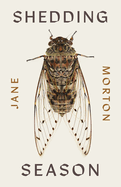
The title of Jane Morton's Shedding Season insists upon change, evoking the idea in both the cyclical nature of a season and in the shedding of one's skin, like a snake. The poems in Morton's beguiling collection similarly insist on the idea of evolution, of one thing unwittingly becoming another. In "Tiktaalik," she uses the 375-million-year-old fossil of a creature somewhere between a fish and a four-legged animal to make the concept concrete, saying, "we know/ only what we have// become: the eaters of flesh./ We are famished./ We swallow whole all things// we don't know, a slow digestion/ of the self." Hunger, too, and desire--these all sound like an alarm throughout Morton's work, a confident debut from a poet unafraid to use language like a sharpened blade.
In the first "Snake Lore" (there are three poems with this title, one in each section), the poem's speaker likens her body to a snake: "Now watch: I'll open up/ past the edges, unhinge// from my body like a snake's jaws." But the desire captured here does not feel rooted in pleasure; instead, fear and pain live inside it, just as they live inside so many of the poems. Morton draws heavily upon nature, but she is no pastoral poet, urging readers toward some peaceable kingdom. Instead, the natural world is held close, a suffocating, menacing thing--the cut of a thistle, the peck of a rooster, the venomous bite of a cottonmouth. Like desire itself, the poems stretch out in wanting, Morton tapping into something hard and true like a stone. --Sara Beth West, freelance reviewer and librarian

